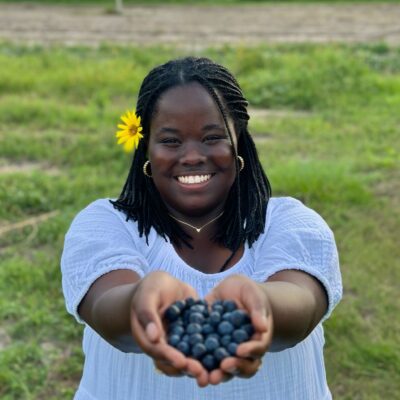Student Spotlight: Faith Twinamaani

September 5, 2023
Faith Twinamaani is a M.S./Ph.D. student in horticulture from Tampa, Florida. She earned a bachelor’s degree in horticultural science with an emphasis on plant biotechnology from the University of Florida and now studies crop adaptation to environmental stress under the guidance of Jason Londo and Katie Gold at Cornell.
What is your area of research and why is it important?
My research will combine plant physiology, climate stress, and remote sensing technology in wine grapes. It’s no secret that climate change is already impacting crop quality, production, and sustainability. The gap of knowledge I want to help fill is how to adapt crops to grow under climate change-induced environmental stress. I plan to do this by linking plant physiological traits to different stress responses, then using tools like remote sensing, drones, and satellites to develop ways to preemptively detect these stressors before it reaches the point of no return for the plant.
What are the larger implications of this research?
Improving climate change resilience in crops is key for supporting the current challenges faced by growers and ensuring we can handle the world’s food production demands in the coming years. Part of what drives my research focus is that it’s not enough that we make sure crops simply survive climate stressors, but that crop quality is still maintained. For example, what if we find that a certain wine grape variety will be able to withstand the climate conditions of the next 80 years, but that fruit quality will start to drop after 50 years? Answering these kinds of questions has important implications for growers and consumers alike.
What does it mean to you to have received an NSF Graduate Research Fellowship?
Receiving this fellowship was empowering as a young scientist just starting out in my research career. During times I doubted my choice to pursue a graduate education, remembering my NSF application was successful was a good reminder of my capabilities as a scientist and potential to succeed in graduate school.
What will your fellowship allow you to do that you may not have been able to otherwise?
I appreciate that the fellowship gives me freedom to take different directions with my research. Applying for the GRFP was also a great initial exposure on how to design and propose my research ideas. As stressful as it was to apply for (especially while working on graduate school applications at the same time) I learned a lot of lessons about myself as a scientist that I will take with me as I start my graduate education.
President Pollack has designated this academic year’s theme as freedom of expression. What does freedom of expression mean to you?
At the Dean’s welcome during my orientation, president Pollack mentioned she hopes this year’s theme will tie into Cornell demonstrating how a diverse society that prioritizes free expression can thrive. To me, “freedom of expression” in this case refers to creating inclusive communities where individuals from diverse backgrounds, perspectives, and abilities are encouraged to embrace what makes them unique. This is lacking in STEM and especially in agriculture. Science is sterile, repetitive, and uniform, but scientists should not be – and we are only better scientists when we work with others whose experiences are different from our own and make space for historically underrepresented groups.
What are your hobbies or interests outside of your research or scholarship?
I love anything related to arts and crafts. I like to draw, paint, and especially crochet! I admittedly spend an embarrassing amount of money on yarn. Outside of academics, I am also part of the American Society for Horticultural Science (ASHS) and Minorities in Agriculture, Natural Resources, and Related Sciences (MANRRS). I hope to find community in different CALS groups to be a part of at Cornell.
Why did you choose Cornell to pursue your degree?
I have lots of interests within plant science including physiology, molecular biology, and how those two fields align with the goals of plant breeding programs. This made deciding where to go to graduate school difficult because I wanted to do it all. But during the decision-making process, I realized I love the applied aspect of horticulture as well as creating tools to help growers make informed decisions and was excited to combine Jason’s expertise in climate adaptation with Katie’s expertise in multimodal sensing in order to do so.
